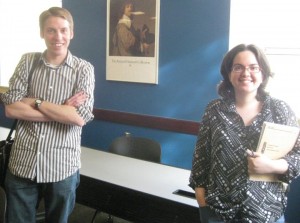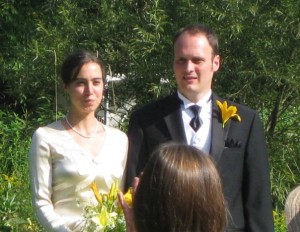Hurting another person is a very easy thing to do.
We often think of “hurt” in terms of the pain induced by bodily injury. This obviously is an important kind of hurt, but we should be careful to construe it rightly. The harm is done to the body, but the hurt is a matter of feeling—a matter of experience—and noticing this should alert us not to jump too quickly to using the body as our primary point of reference in trying to understand what hurting is. We can indeed hurt a person through assaulting her body, but there are many other, deeper, and more subtle ways in which we can hurt another.
 People are very sensitive beings. Again, they are of course sensitive in that they have an immediate sensory vulnerability to things through touch, sight, hearing and so on. They have deeper sensitivities, though, than these matters of immediate bodily stimulation: people are deeply and intimately sensitive to matters of personal and interpersonal success and failure, of aspiration and accomplishment, of hope and fear, and these are the sensitivities that primarily define and colour our experience. Mostly, we are sensitive to the question of who we are and whether we are worth anything. And, though we can and do frame our own personal ideas about these matters, we mostly depend on the behaviour of others to establish for us how we should evaluate ourselves. It is around these most basic sensitivities that we are most vulnerable to others, most able to be hurt.
People are very sensitive beings. Again, they are of course sensitive in that they have an immediate sensory vulnerability to things through touch, sight, hearing and so on. They have deeper sensitivities, though, than these matters of immediate bodily stimulation: people are deeply and intimately sensitive to matters of personal and interpersonal success and failure, of aspiration and accomplishment, of hope and fear, and these are the sensitivities that primarily define and colour our experience. Mostly, we are sensitive to the question of who we are and whether we are worth anything. And, though we can and do frame our own personal ideas about these matters, we mostly depend on the behaviour of others to establish for us how we should evaluate ourselves. It is around these most basic sensitivities that we are most vulnerable to others, most able to be hurt.
These sensitivities in ourselves and in others are basically what make life worthwhile. Caring for them well is quite challenging. Mistreating them is extremely easy.
Responding to sensitivity with brutality is an easy answer. Deciding that we “don’t care” about another’s cares and feelings can make us feel powerful, in part because we can feel the power of our own ability to have an impact [a hurtful one] on another, and in part because we can feel autonomous in recognizing that we do not have to be controlled by another’s concerns. Deciding that we “don’t care” about our own sensitivities can again give us a sense of liberation as we feel ourselves freed from the vulnerabilities that trouble us, or it can subtly gratify our desire to punish ourselves for being so “weak.” In each case, though—this sense of freedom won at the expense of others, or this sense of strength won at the expense of one’s own human vulnerability—is ultimately just a failure to respect what is most important in our lives.
If we think further about what form a human life takes, we can see more fully the forms this hurt can take beyond the simple and direct feelings involved in immediate exchanges.
People live complex and highly developed lives in which, through their projects and practices, they become highly invested in, and inter-related with, other people and things.
Our involvement with other people means that we depend upon those others first to allow us to rely upon them and second to live up to the commitments they thus make to us. We must be attentive to the ways we are offering ourselves to others and telling them that they can depend upon us, for our failure to follow through on these commitments is one of the most serious ways we hurt another.
 People also invest themselves in things, whether these are the “tools of their trade” that are the basic materials (chair, computer, bedroom, camera) through which they carry out their characteristic practices, or the clothes and ornaments through which they present themselves publicly, or the sentimental objects that are the means by which they hold onto their past and their emotional attachments. These things embody the person, and the person is thus vulnerable through them. Whenever we treat the materials of the human world as “just things,” whether as a parent manhandling a daughter’s possessions or as a business-person forcing a dollar-value on the goods by which a community establishes its life, we are hurting someone who has something deeply invested in those things.
People also invest themselves in things, whether these are the “tools of their trade” that are the basic materials (chair, computer, bedroom, camera) through which they carry out their characteristic practices, or the clothes and ornaments through which they present themselves publicly, or the sentimental objects that are the means by which they hold onto their past and their emotional attachments. These things embody the person, and the person is thus vulnerable through them. Whenever we treat the materials of the human world as “just things,” whether as a parent manhandling a daughter’s possessions or as a business-person forcing a dollar-value on the goods by which a community establishes its life, we are hurting someone who has something deeply invested in those things.
Through things and through other people, persons are stretched out far beyond the limits of their immediate bodies. People also live long lives, and this temporal endurance again brings with it particularly possibilities for hurt.
 Lives are hard to plan for, and they’re hard to live through. As the years pass, we reap the benefits of the good choices we made for cultivating a rich and rewarding personal and interpersonal environment, and we dwell ever more painfully in the consequences of the different forms of personal and interpersonal damage we’ve done or suffered.
Lives are hard to plan for, and they’re hard to live through. As the years pass, we reap the benefits of the good choices we made for cultivating a rich and rewarding personal and interpersonal environment, and we dwell ever more painfully in the consequences of the different forms of personal and interpersonal damage we’ve done or suffered.
It’s easy, in the flash of a moment, to be brutal in dealing with another person. This can be true in how we handle a simple conversational exchange, or in how we decide about the future of our relationship. Decisions that look appealing in the charged and narrow perspective of a moment can damage a friendship or a life for a long time to come. How we handle our sexual intimacy with each other is especially charged: it is easy to treat this tender and difficult domain casually, callously or defensively, with the result that we turn our sexual life into a site of alienation rather than intimacy. The pressures and demands of handling these situations of friendship and sexuality well can seem at times too hard to face, but those demands are ultimately small in comparison to the enduring hurt of handling them poorly.
At the same time as we remember the importance—indeed, the urgency—of handling these sensitive matters carefully, we must always remember that it is unavoidably the case that we will always hurt others. No one can act in a way that adequately respects the needs of another, and therefore we will always be giving each other grounds for dissatisfaction and complaint. Here, too, in experiences in which we feel legitimate in adopting the stance of reprimanding another, we find an invitation to brutality. And so, finally, we must remember to be sensitive to each other’s need to be forgiven for our failings.


 Participants in these
seminars consistently have the experience of growth in their conversation and
conceptual abilities, and typically leave with a transformed sense of the nature
and possibilities of philosophy.
Participants in these
seminars consistently have the experience of growth in their conversation and
conceptual abilities, and typically leave with a transformed sense of the nature
and possibilities of philosophy.





3 Comments
I am reflecting on your revelation “that it is unavoidably the case that we will always hurt others”. This can be viewed as the perfect excuse for willfully and intentionally hurting others. How do you differentiate it from hurting others as a result of poor choice and ignorance?
Well, when we call something an “excuse,” we usually mean a dishonest pretence of justification, and that would be the case here: that fact that we cannot avoid hurting people does not justify us in intentionally hurting others. At the same time, it is sometimes important to act in some particular way for some independent reason, realizing that it will hurt someone. In that case, though, hurting the other person is not the goal of the action. I think the distinction you point to, between hurting another intentionally and hurting others through poor choice and ignorance is a very important one: it is often here that it is incumbent upon us to study our own actions and understand more deeply what is involved in our behaviour; it is also here that we will always have blindspots, partially because our own action will always be in some ways opaque to us, and partially because the needs and interests of others will also always remain in important ways opaque to us.
This challenge of the manner in which we unavoidably hurt others is a good way of showing how vulnerability is connected to honesty. Inflicting and suffering pain opens our experience to the honest reassessment of what we have done and are doing.